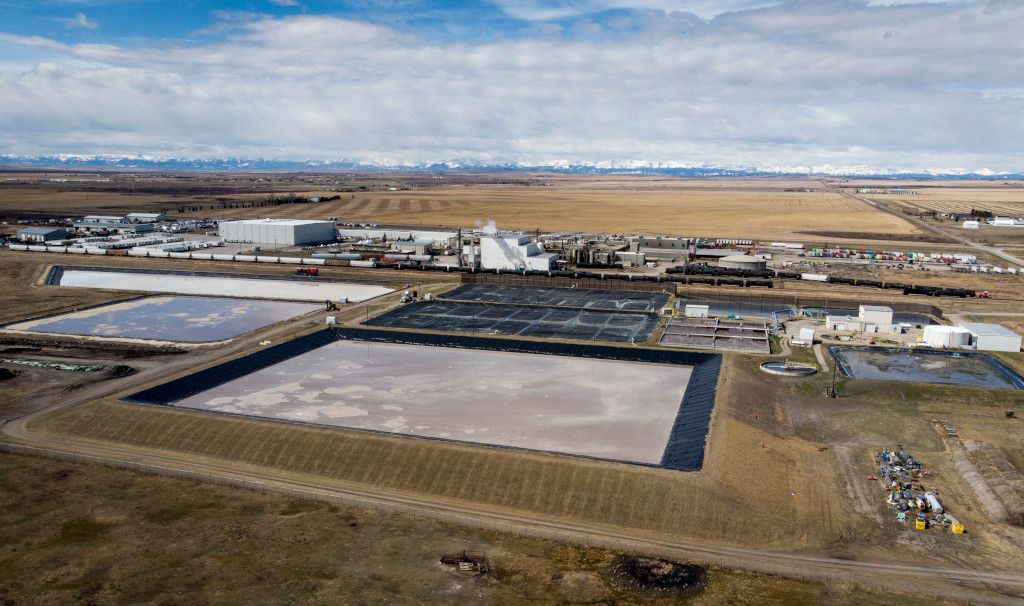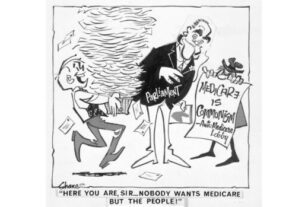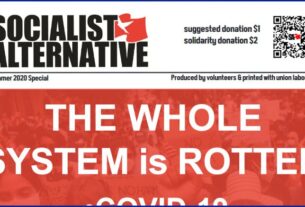One of the most blatant examples of capitalism’s relentless pursuit of profits at all costs is being played out in High River, Alberta. Cargill’s meatpacking plant in High River has had the largest single-site outbreak of COVID-19 in Canada. With links to more than 1,200 COVID-19 cases as of April 29, 821 workers have tested positive and one worker has died (Later update: 3 people died due to the outbreak). Seven workers are currently in hospital, five of them in intensive care. This outbreak is close to a quarter of all Alberta’s COVID-19 cases.
Finally forced to shut down just over a week ago after the death of a woman worker in her sixties, on April 29 it announced plans to re-open on May 4. Michael Hughes, a spokesman for the United Food and Commercial Workers (UFCW) local 401, which represents the 2,000 workers at the High River plant, said it was “dumbfounded” by the decision. “The reopening of the plant is rushed, it’s inappropriate and it puts not only our members, but Albertans, at risk,” Hughes said.
The actions of Cargill, with 8,000 employees in Canada, have not only led to hundreds of workers being infected with COVID-19, but have more far-reaching consequences. The spread of the virus from the meatpacking plant into wider community networks is endangering the health and lives of hundreds, if not thousands, of immigrant workers, local First Nations and elderly people.
Exponential growth in days
In a matter of a few days, the outbreak grew from 38 known cases to 358, an increase of 842 percent. The COVID-19 cases started to emerge during the first week in April. Workers became increasingly worried, particularly since their work conditions involved them working “elbow-to-elbow,” as they process up to 4,500 animals per day. There was a lack of protective equipment and plant workers said that for two weeks, the company provided masks to managers, but not to production workers.
Workers were fearful about infecting their family members. The spouses of at least three of the workers who tested positive during this period work in long-term care facilities. CUPE Alberta reported that employees at Seasons Retirement Community in High River have tested positive for COVID-19. Some of these live with employees of the Cargill plant.
Some members of the Stoney Nakoda Nation work at the High River plant. On April 27, the First Nation announced that 15 community members (14 in Eden Valley and one in Morley), have tested positive for COVID-19. Public health officials’ contact tracing led them to believe some of these cases are related to Cargill’s plant in High River.
Despite calls by the union and NDP for an inspection, this was not done. Instead, a live video inspection by Alberta Occupational Health and Safety, conducted after dozens at the plant were already sick, concluded the work site was safe to remain open.
About 60 to 80 percent of the workforce are members of the Filipino community, many of whom are employed under Canada’s Temporary Foreign Worker program. Their concern moved more than 250 Filipino residents to write the mayor of High River on April 12 calling for the plant to be shut down for at least two weeks.
The same day, the UFCW local 401 wrote Cargill calling for “An immediate 2-week closure of your plant to conduct a comprehensive assessment of its safety.” The union said: “There is no reason to believe that hundreds of individuals in your working environment won’t soon be carrying the virus….the workplace is arranged around something that is the opposite of ‘social distancing’…. Unfortunately, the employer is just not doing enough to protect its employees in this environment.”
Some workers, even those who tested positive, felt pressured to come back to work too soon according to the CBC who interviewed several workers.
“I was told on April 12 by Alberta Health Services that I was positive and needed to quarantine another 14 days,” Christian said. “Cargill called me [three days later] and asked if I could come back to work tomorrow. How can I go back to work, I asked, if my result is positive? They said, even if you are positive, if there’s no symptoms you can go back to work. Honestly speaking, they don’t care about their employees. They’re saying they can replace people at anytime. They don’t care.”
Vulnerability of immigrant workers
Immigrant workers are among the most vulnerable in this pandemic. Canada’s Temporary Foreign Worker Program relies on immigrant workers for jobs that Canadians will not fill, because the work is hard, dangerous and dirty and the pay is low. Meat processing is one of the industries that employs many temporary foreign workers. Though they pay taxes and pay into the employment insurance system, these workers earn less than the Canadian average and lack access to basic protections such as sick leave. Canada’s occupational health and safety system relies on workers to make complaints and assert their rights. Yet, for workers whose future in Canada is dependent on the time-limited work permit tied to their employer, this puts them at great disadvantage. They fear reprisal including being sent back to their home country if they speak out about unsafe work conditions. Also, as many temporary foreign workers save money to send back to their families and therefore live together in crowded housing, their risk of being infected and spreading the coronavirus is greater.
Outbreaks at other meatpacking plants
In addition to the High River plant, two other meatpacking plants in Alberta have outbreaks. At JBC in Brooks, 180 kilometers southeast of Calgary, 276 employees as of April 29 have tested positive and a worker has died. At the Harmony Beef Plant just north of Calgary, there was a small outbreak in late March. These three plants represent approximately three-quarters of beef suppliers in Canada.
Across the US, dozens of plants have COVID-19 outbreaks and at least twenty workers have died. Yet the owners and Trump want them to stay open. Chicken plants are also a hotbed, with four plants closed due to outbreaks in BC alone.
Throwing workers into the fire
Now that Cargill plans to re-open, workers and their union are sounding the alarm.”If COVID-19 is a fire, they’re throwing us into it, “a UFCW representative said. “It’s incredibly concerning that Cargill would be even thinking of reopening in a matter of days while presiding over the biggest outbreak in [Canada] and while half of its employees are sick with COVID-19.” UFCW states that it is exploring legal action to keep the plant shut. Union spokesperson Michael Hughes says, “There are a number of options on the table and we are pursuing everything that’s available to us to stop that plant from opening up on Monday.”
The Alberta NDP has called for an inquiry into how the coronavirus response was handled at that, and other meat facilities, in Alberta. While the union is outraged and says it is exploring all options, it is crucial that they act now before even more workers lose their lives. They should be calling for workers to refuse to work, to strike if necessary.
Workplace democracy
Gil McGowan, president of the Alberta Federation of Labour, says there are broader issues raised by this disaster. One is the huge blind spot of Alberta’s United Conservatives to workers’ health and safety. Employers, especially in meatpacking, are still allowed to give “attendance bonuses,” encouraging workers who are sick to come to work. He says that many of AFL’s affiliated unions have told him that “dozens and dozens of their members have tested positive while working in jobs that have been deemed essential.” The government is quick to call workers “essential” but when it comes time to protect workers, its silence speaks louder than words.
Meat processing workers earn 20 percent less than the average industrial wage yet are considered “essential.” “It is deeply unjust that workers deemed ‘essential’ in this pandemic are the same workers who are unable to access pathways to Canadian citizenship and to equitable workplace health and safety,” says Bronwyn Bragg.
Another critical issue is the total lack of workplace democracy. While expected in capitalism, it is outrageous that even in the midst of a pandemic, workers’ concerns have been completely ignored and disregarded. Not only did Cargill ignore the union’s concerns for workers’ safety amid the growing number of COVID-19 cases, it did not notify the union that it plans to re-open or provide any assurance that its safety concerns have been addressed. Gil McGowan says that he has a general concern that employers, whether they are meatpacking plants or long-term care facilities, are not consulting workers about their concerns related to COVID-19.
Cargill: union-busting background
According to Forbes, Cargill is the largest private company in the U.S. with $113.5 billion in revenue and 160,000 employees. The Minneapolis-based company operates in 70 countries. It has a record of union-busting tactics. In Turkey, fourteen union activists are protesting after having been dismissed from their jobs in April 2018 while organizing a union at Cargill Turkey’s corn milling facility in Bursa-Orhangazi. In August 2019, UFCW issued a statement calling on UFCW activists and allies to“help stop the union-busting tactics of global meat giant Cargill, who is punishing workers for expressing their democratic right to join a union.”
The carnage of capitalism
This carnage epitomises the indifference, if not complete disregard, that private corporations show everyday to workers’ concerns. When pressed, they spew a stream of “caring” words but there is nothing behind them. Despite the company’s claim to “care for” workers, this situation illuminates what it really cares about: making money. They are only too happy to sacrifice a few workers to fill their ravenous and insatiable appetite to make a buck.
And governments like Alberta’s are only too happy to comply, making it as easy as possible for business as usual to continue. By designating Cargill an essential service, they helped ensure that “one of the largest and most profitable companies in the world continued operations – while workers suffered the consequences” said Bronwyn Bragg.
But as UFCW representative Thomas Hesse said, “No one should have to die for us to eat a hamburger.”
Socialist Alternative agrees. To help ensure that workers do not die or suffer ill health, we urge the Canadian Labour Congress and all provincial labour federations to assert these demands loud and clear:
- Workers be given full protection against the COVID-19 pandemic. This means having protective clothing, masks and gloves and appropriate physical barriers and distancing from others in their workplace.
- Workers be consulted about their concerns and be given a democratic right to organize their workspace to protect themselves.
- Above all, we demand that all workers be given the right to refuse unsafe work.
If any workers are victimized by an employer, government or court for defending basic safety, the full strength of Canada’s unions will defend them. Organized workers cannot leave more vulnerable workers isolated to fight for their lives alone. “An injury to one is an injury to all.”
The democratic rights of workers are fundamental to socialism. As Marx said, “Workers of the world, unite! You have nothing to lose but your chains!”



